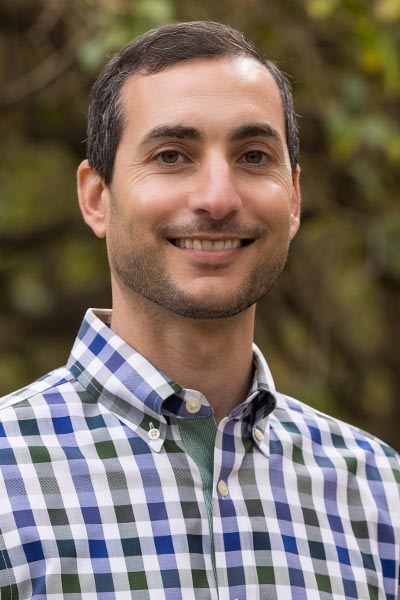
Andrew Goldstein
Professor and MCDB Vice Chair of Undergraduate Education
email: agoldstein@mednet.ucla.edu
phone: (310) 206-1402
office: 3141 Terasaki Life Sciences Building
lab website
Research Interests
The research in the Goldstein laboratory is focused on the intersection between cancer biology, stem cell biology and metabolism. During his graduate work, Dr. Goldstein described the isolation of epithelial progenitor cells from mouse and human prostate tissue and demonstrated the capacity of progenitor cells to initiate prostate cancer in response to oncogenic transformation. Following up on this work, Dr. Goldstein and colleagues determined that prostate cancer can evolve from a basal cell of origin to a luminal-like tumor-propagating cell population. More recently, the Goldstein laboratory has been investigating the interplay between inflammation, epithelial progenitor cells, and tumorigenesis, using a combination of mouse and human tissue models. The main goals of the lab are to elucidate the cellular and molecular mechanisms promoting epithelial cancer initiation, progression and resistance to treatment.
Selected Publications
Crowell PD, Fox JJ, Hashimoto T, Diaz JA, Navarro HI, Henry GH, Feldmar BA, Lowe MG, Garcia AJ, Wu YE, Sajed DP, Strand DW, Goldstein AS, "Expansion of luminal progenitor cells in the aging mouse and human prostate", Cell Reports 28 (6): 1499-1510 (2019). [link]
Crowell PD, Giafaglione JM, Hashimoto T, Diaz JA, Goldstein AS, "Evaluating the Differentiation Capacity of Mouse Prostate Epithelial Cells Using Organoid Culture", Journal of Visualized Experiments (2019). [link]
Fox JJ, Navarro HI, Hashimoto T, Garcia AJ, Goldstein AS, "Mass cytometry reveals species-specific differences and a new level of complexity for immune cells in the prostate", Am J Clin Exp Urol 7 (4): 281-296 (2019). [link]
Mottahedeh J, Haffner MC, Grogan TR, Hashimoto T, Crowell PD, Beltran H, Sboner A, Bareja R, Esopi D, Isaacs WB, Yegnasubramanian S, Rettig MB, Elashoff DA, Platz EA, De Marzo AM, Teitell MA, Goldstein AS, "CD38 is methylated in prostate cancer and regulates extracellular NAD+", Cancer & Metabolism 6: (2018). [link]
Navarro HI, Goldstein AS, "HoxB13 mediates AR-V7 activity in prostate cancer", Proceedings of the National Academy of Sciences of the United States of America 115: 6528-6529 (2018). [link]
Crowell PD, Goldstein AS, "Functional evidence that progenitor cells near sites of inflammation are precursors for aggressive prostate cancer", Mol Cell Oncol 4 (2): (2017). [link]
Remacle F, Goldstein AS, Levine RD, "Multivariate Surprisal Analysis of Gene Expression Levels", Entropy 18 (12): (2016). [link]
Liu X, Grogan T, Hieronymus H, Hashimoto T, Mottahedeh J, Cheng D, Zhang L, Huang K, Stoyanova T, Park JW, Shkhyan RO, Nowroozizadeh B, Rettig MB, Sawyers CL, Elashoff D, Horvath S, Huang J, Witte ON, Goldstein AS, "Low CD38 Identifies Progenitor-like Inflammation-Associated Luminal Cells that Can Initiate Human Prostate Cancer and Predict Poor Outcome", Cell Reports 17 (10): 2596-2606 (2016). [link]
Stoyanova T, Riedinger M, Lin S, Faltermeier CM, Smith BA, Zhang KX, Going CC, Goldstein AS, Lee JK, Drake JM, Rice MA, Hsu EC, Nowroozizadeh B, Castor B, Orellana SY, Blum SM, Cheng D, Pienta KJ, Reiter RE, Pitteri SJ, Huang J, Witte ON, "Activation of Notch1 synergizes with multiple pathways in promoting castration-resistant prostate cancer", Proc Natl Acad Sci U S A 113 (42): E6457-E6466 (2016). [link]
Zong Y, Goldstein AS, Witte ON, "Preparation of Urogenital Sinus Mesenchymal Cells for Prostate Tissue Recombination Models", Cold Spring Harb Protoc 11: 988-990 (2015).
Zong Y, Goldstein AS, Witte ON, "Dissociated Prostate Regeneration under the Renal Capsule", Cold Spring Harb Protoc 11: 991-994 (2015).
Strand DW, Goldstein AS, "The many ways to make a luminal cell and a prostate cancer cell", Endocr Relat Cancer 22: T187-T197 (2015).
Liu X, Goldstein AS, "Inflammation promotes prostate differentiation", PNAS USA 111: 1666-1667 (2014). [link]
Stoyanova T, Goldstein AS, "Distinct phases of human prostate cancer initiation and progression can be driven by different cell-types", Cancer Cell Microenviron 1: (2014).
Janzen DM, Cheng D, Schafenacker AM, Paik DY, Goldstein AS, Witte ON, Jaroszewicz A, Pellegrini M, Memarzadeh S, "Estrogen and progesterone together expand murine endometrial epithelial progenitor cells", Stem Cells 31: 808-822 (2013).

